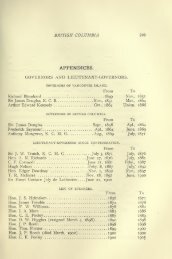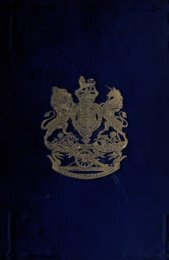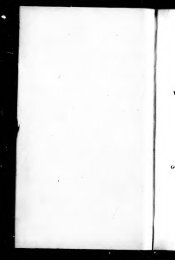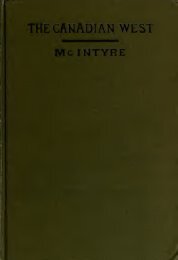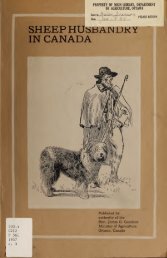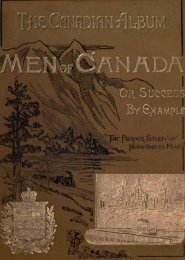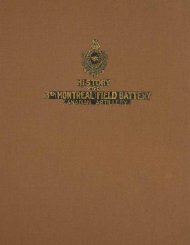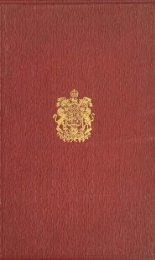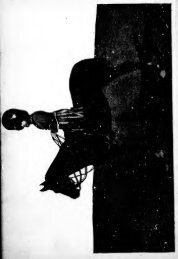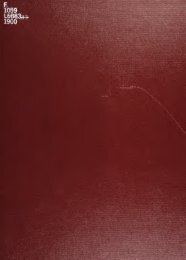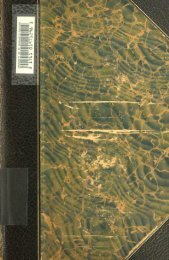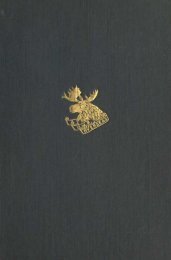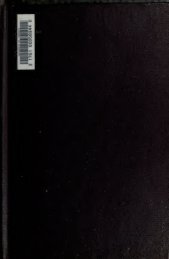Royal Scots of Canada Highlanders - Electric Scotland
Royal Scots of Canada Highlanders - Electric Scotland
Royal Scots of Canada Highlanders - Electric Scotland
Create successful ePaper yourself
Turn your PDF publications into a flip-book with our unique Google optimized e-Paper software.
5th ROYAL SCOTS OF CANADA 69<br />
the universal Campbell emblem and the Campbell <strong>of</strong><br />
Harris motto as the regimental badge. This badge<br />
continued to be worn in its original shape until<br />
1878 or 1879 when the motto "I Beare in Minde"<br />
was replaced by the words "Quis Separabit"<br />
(Who shall part us) which was the motto <strong>of</strong> the old 5th<br />
Roval Light Infantrj-. This motto, which continued to<br />
form part <strong>of</strong> the badge <strong>of</strong> the <strong>Royal</strong> <strong>Scots</strong> imtil the<br />
issue<br />
<strong>of</strong> the General Order already (juoted, is the motto <strong>of</strong> the<br />
order <strong>of</strong> Knighthood <strong>of</strong> St. Patrick, and <strong>of</strong> three Irish<br />
regiments in the regular service—the Fourth Dragoon<br />
Guards (<strong>Royal</strong> Irish), the 5th Lancers (<strong>Royal</strong> Irish) and<br />
the Connaught Rangers (88th and 94th Foot). The<br />
boar's head and the motto "Ne Obliviscaris" (Forget<br />
not) form part <strong>of</strong> the badge <strong>of</strong> the Princess Louise's<br />
Regiment, Argyll and Sutherland <strong>Highlanders</strong> — (91st and<br />
93rd Foot.)<br />
Since the adoption <strong>of</strong> the kilt the regiment has worn<br />
the thistle as a distinctive collar badge.<br />
The changes in the personel <strong>of</strong> the regiment since the<br />
reorganization have been quite as marked as have those<br />
<strong>of</strong> uniform and equipment.<br />
Lieut.-Colonel J. D. Crawford retired from the command<br />
April 14th, 1882. After this event considerable<br />
anxiety was experienced with regard to the procuring <strong>of</strong><br />
a suitable successor to the command. The situation was<br />
complicated by the resignation <strong>of</strong> Major Geddes, the<br />
second in command. The unanimous choice <strong>of</strong> <strong>of</strong>ficers<br />
and non-commissioned <strong>of</strong>ficers,<br />
as expressed by numerous<br />
resolutions and memorials, was Major Kenneth Campbell,<br />
and the militia authorities supported the demand <strong>of</strong> the<br />
regiment. January 14th, 1882, Lieut.-Colonel P. W.<br />
Worsley, then Brigade Major at Montreal, wrote Major<br />
Campbell in the following terms:— "The battalion is virtually<br />
without any head, and it is the universal desire<br />
<strong>of</strong> the department, the staff, and I may say the unanimous<br />
wish <strong>of</strong> tlie <strong>of</strong>ficers, non-commissioned <strong>of</strong>ficers and<br />
men <strong>of</strong> the Battalion, that you should command. I<br />
therefore trust you will accede to the wishes <strong>of</strong> the many,<br />
and allow yourself to be nominated and gazetted to the<br />
command. Otherwise the Battalion will certainly have<br />
to be disbanded. The General has written specially on<br />
this subject, and jou will receive every assistance we<br />
can give you."<br />
His business engagements prevented Major K.<br />
Campbell from accepting the command, which was tendered<br />
to and accepted by Captain E.A.C. Camjjbell, <strong>of</strong> St.<br />
Hilaire, who had .served and attained his captaincy in<br />
H. M. 92nd, Foot, the second battalion <strong>of</strong> the Gordon<br />
<strong>Highlanders</strong>. He was gazetted to the command <strong>of</strong> the<br />
<strong>Royal</strong> <strong>Scots</strong> Fusileers with the rank <strong>of</strong> Lieut.-Colonel,<br />
April 14th, 1882, and his resignation was accepted by<br />
General Orders dated November 14th, 1884.<br />
Lieutenant-Colonel Edmund A. C. Campbell,, who<br />
died in England, March 10, 1902, was one <strong>of</strong> the historical<br />
Inverawe family <strong>of</strong> Campbells. It was his grand<br />
uncle, Major Duncan Campbell, the Laird <strong>of</strong> Inverawe,<br />
who, in iulfilment <strong>of</strong> one <strong>of</strong> the most singular premonitions<br />
recorded in history, fell while leading the Black<br />
Watch to the assault <strong>of</strong> the formidable intrenchments at<br />
Ticonderoga, July 8th, 1758. Another grand uncle (a<br />
brother <strong>of</strong> the Major), Captain Donald Campbell, also <strong>of</strong><br />
the Black Watch, met his death on the same ill-fated<br />
field. Although mortally wounded, Major Campbell<br />
survived for several days, and was carried by his clansmen<br />
back to Fort Edward, where the body was interred.<br />
Lieut.-Colonel E. A. C. Campbell was succeeded in<br />
the command <strong>of</strong> the <strong>Royal</strong> <strong>Scots</strong> by Major Frank<br />
Caverhill, whose promotion to the rank <strong>of</strong> Lieutenant-<br />
Colonel appeared in<br />
the same gazette as his predecessor's<br />
5th<br />
royal five<br />
1869<br />
Captain J. Esdaile in command<br />
retirement. I/ieutenant-Colonel Caverhill had had a<br />
creditable record in the regiment, and was greatly<br />
beloved by all ranks. He entered the regiment as<br />
ensign October 3i.st, 1877, and was promoted Lieutenant<br />
March 15th, 1878; Captain, December 27th, 1878, and<br />
Major, May 12th, 1882. He retired from the command<br />
March 5th, 1891, and died May 21st, 1899, universally<br />
regretted.<br />
by his old regiment.<br />
His remains were accorded a military funeral<br />
Lieut.-Colonel Caverhill was succeeded in the command<br />
by Lieut.-Col. John Hood, who had for many<br />
years been one <strong>of</strong> the most active members <strong>of</strong> the



